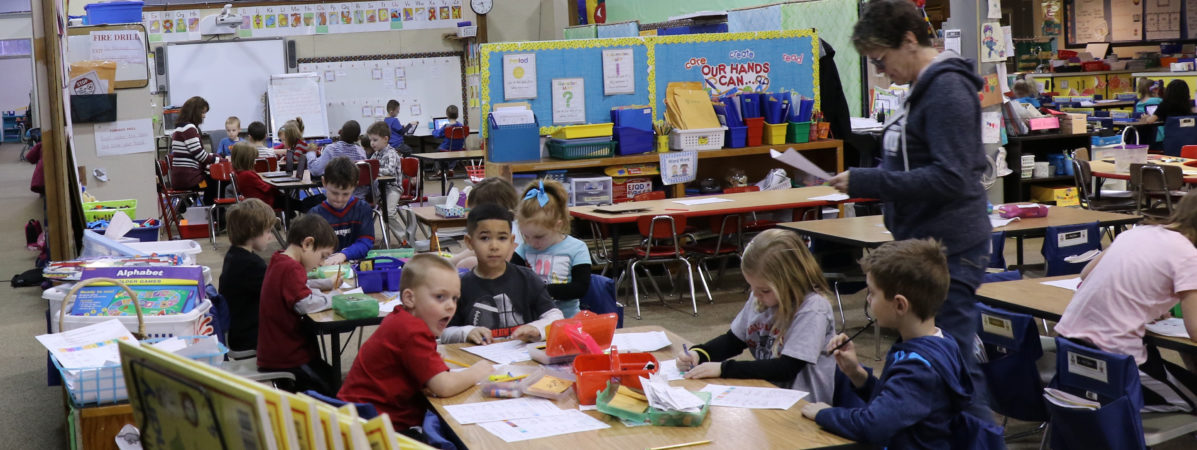
The landscape of early schooling is drastically changing. More and more children are attending school at an earlier age. At the same time, early childhood and kindergarten programs are increasing focus on academic content.
But are these children ready for school?
Most parents and teachers will tell you that children’s abilities to “self-regulate” – that is, follow directions, pay attention, sit still and minimize disruptive behaviors – are among the most important skills necessary.
And with good reason: Such early behaviors predict academic success throughout school and even later educational attainment. Some preschool-age children with self-regulation difficulties are even expelled from preschool.
We are researchers who evaluate what skills prepare children to succeed in school. The problem that our work has identified is that most children are still learning to manage their own behavior at the start of kindergarten. Many are simply not ready for the behavioral demands of kindergarten. And some are already two years behind their peers at kindergarten entry.
To look at differences in how children develop self-regulation, we tested nearly 1,400 children from diverse backgrounds. Children were tested multiple times in preschool, from preschool to kindergarten, and preschool into first grade.
We used a game-like assessment called the “Head-Toes-Knees-Shoulders” task to measure children’s developing self-regulation skills.
Every time the experimenter said “touch your head,” the child had to remember to touch her toes instead, and when told to “touch your toes,” the child had to touch her head.
Sounds easy? Perhaps for the first part. The assessment became a lot harder as we added shoulders and knees. This task required children to engage their ability to remember the rules, do a different action than what the experimenter said, and keep focused throughout the task.
We found that children had three different patterns of development: Some children entered preschool already demonstrating higher levels of self-regulation compared to their peers and quickly gained higher skill levels. For example, if most children start at “zero” on a scale of zero to 40, then the early developers started approximately 10 points ahead.
But most children started with lower self-regulation skills and gradually developed during preschool until they were ready for kindergarten.
The most troubling finding was that around 20 percent of children hardly showed any gains in self-regulation skills – such as remembering complex directions, raising their hand before speaking or taking turns with others – during their preschool years.
These children were attending preschool programs, usually four days a week, for one or two years, and yet they were lagging behind their peers in the self-regulation skills they would need in kindergarten.
The ones who had the most difficulty were more likely to be children from families where mothers had lower education levels, and children with lower levels of English vocabulary. They also tended to be male children.
For example, in our study, even though we had slightly fewer boys than girls (about 49 percent), when we looked into who the later developers were, up to 58 percent of them were boys. That is a noteworthy difference.
Other researchers who recently studied the same question as ours found remarkably consistent results. Specifically, researcher Michael Willoughby concluded that at least 10 percent of children showed few or no gains in self-regulation across preschool. This had devastating consequences during their kindergarten years related to behavior and academic achievement.
Children who develop self-regulation later are generally the same children who lag behind their peers in the academic skills we value and target.
There is some evidence that the children who start kindergarten with lower self-regulation not only do not catch up by first or even second grade, but in some cases may be falling even further behind.
For example, a child with lower self-regulation in kindergarten is likely to have lower math skills throughout elementary school. What is worse, in early elementary grades that skill gap could further widen.![]()
Our ongoing research evaluating literacy skills among children until second grade echoes these findings. Just as with math, later developers do not appear to catch up when it comes to letter and word recognition, awareness of word sounds and reading comprehension. In fact, the gaps grow wider across kindergarten and first grade.
Does this mean that early childhood programs should eliminate their academic focus?
We are not arguing for this. Research shows that the early introduction of academic material does help prepare children for school success.
Rather, what we are arguing for is what teachers have been observing for at least two decades – that programs that value children’s early social emotional development, and particularly their self-regulation skills, are critical. The development of these skills need individualized focus along with academic materials.
Teachers need to make sure children are not overtired or hungry or that there is not some other physical need. Research shows the body and brain work together to self-regulate.
Parents can set strong routines including bedtime, other rest times and consistent snack times. Such routines ensure children’s brains are ready to engage in tough academic work.
After that, children need practice. It is important to understand that paying attention, remembering directions and avoiding disruptive behaviors are all skills that can be practiced through daily interactions. Games that require rules can be used for practicing these skills.
If children are to get the most out of early academic content, they need to be prepared for it. As it turns out, some of us need both a little bit more practice and lot more help in order to be ready to succeed.
Janelle J. Montroy, Assistant Professor of Pediatrics, The University of Texas Medical Branch and Ryan Bowles, Associate Professor of Human Development and Family Studies, Michigan State University
This article was originally published on The Conversation. Read the original article.

We want to hear from you!
Please take this 5-minute survey and help us serve you better.
